Related Research Articles
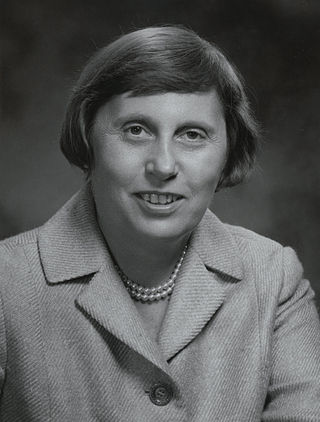
Ella Rosa Giovianna Oliva Grasso was an American politician and member of the Democratic Party who served as the 83rd Governor of Connecticut from January 8, 1975, to December 31, 1980, after rejecting past offers of candidacies for Senate and Governor. She was the first woman elected to this office and the first woman to be elected governor of a U.S. state without having been the spouse or widow of a former governor. She resigned as governor due to her battle with ovarian cancer.
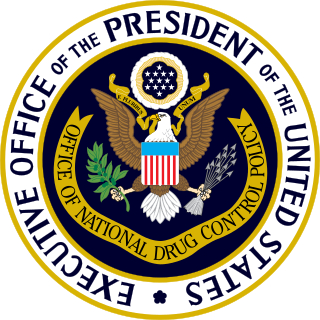
The Office of National Drug Control Policy (ONDCP) is a component of the Executive Office of the President of the United States.

Mary Carolyn "Jodi" Rell is an American former Republican politician who served as the 87th governor of Connecticut from 2004 until 2011. Rell also served as the state's 105th lieutenant governor of Connecticut.

The 2006 Connecticut gubernatorial election occurred on November 7, 2006. Incumbent Republican Jodi Rell became governor when John G. Rowland resigned on corruption charges in 2004. Rell had an approval rating of 70% as of October 19, 2006, and polls showed her leading the Democratic nominee, New Haven mayor John DeStefano by a near 30-point margin. As expected, she won the election to a full term in a landslide. DeStefano defeated Stamford Mayor Dannel Malloy in the Connecticut Democratic gubernatorial primary on August 8. As of 2023, this was the last time a Republican was elected Governor of Connecticut, and the last time any gubernatorial candidate won every county in the state.

Edward Miner Lamont Jr. is an American businessman and politician serving as the 89th governor of Connecticut since January 9, 2019. A member of the Democratic Party, he served as a Greenwich selectman from 1987 to 1989. He ran for the United States Senate in 2006, defeating incumbent Joe Lieberman in the Democratic primary, but losing to him in the general election, when Lieberman ran as an independent candidate.

Dannel Patrick Malloy is an American politician, who served as the 88th governor of Connecticut from 2011 to 2019. A member of the Democratic Party, he chaired the Democratic Governors Association from 2016 to 2017. On July 1, 2019, he began his tenure as the Chancellor of the University of Maine System.

In the United States, the non-medical use of cannabis is legalized in 23 states and decriminalized in 8 states, as of May 2023. Decriminalization refers to a policy of reduced penalties for cannabis offenses, typically involving a civil penalty for possessing small amounts, instead of criminal prosecution or the threat of arrest. In jurisdictions without penalty the policy is referred to as legalization, although the term decriminalization is sometimes used for this purpose as well.

Drug liberalization is a drug policy process of decriminalizing or legalizing the use or sale of prohibited drugs. Variations of drug liberalization include: drug legalization, drug re-legalization and drug decriminalization. Proponents of drug liberalization may favor a regulatory regime for the production, marketing, and distribution of some or all currently illegal drugs in a manner analogous to that for alcohol, caffeine and tobacco.

The use, sale, and possession of cannabis over 0.3% THC in the United States, despite laws in many states permitting it under various circumstances, is illegal under federal law. As a Schedule I drug under the federal Controlled Substances Act (CSA) of 1970, cannabis over 0.3% THC is considered to have "no accepted medical use" and have a high potential for abuse and physical or psychological dependence. Cannabis use is illegal for any reason, with the exception of FDA-approved research programs. However, individual states have enacted legislation permitting exemptions for various uses, including medical, industrial, and recreational use.
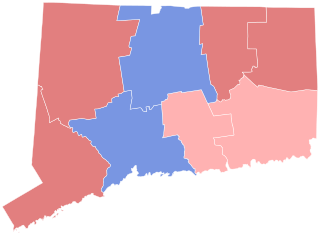
The 2010 Connecticut gubernatorial election took place on November 2, 2010, to elect the 88th Governor of Connecticut. Incumbent Republican Governor Jodi Rell had announced in a press conference in Hartford on November 9, 2009, that she would not seek re-election in 2010. The sites Cook Political Report and CQ Politics both rated the election as a toss-up. This was the first open seat gubernatorial election in the state since 1994. As of 2022, this is the last time the Governor’s office in Connecticut changed partisan control.

Tony Hwang is an American real estate agent and politician. A Republican, he is a member of the Connecticut State Senate, for the 28th District, which covers parts of Fairfield County. Previously, Hwang as a member of the Connecticut House of Representatives for the 134th District in the Connecticut General Assembly. Hwang became a state representative in 2008 and won re-election in 2010 and 2012. He was elected to the state Senate in 2014 and subsequently reelected. He is the assistant Senate Minority Leader.

Cannabis political parties are generally single-issue parties that exist to oppose the laws against cannabis.

California Proposition 19 was a ballot initiative on the November 2, 2010, statewide ballot. It was defeated, with 53.5% of California voters voting "No" and 46.5% voting "Yes." If passed, it would have legalized various marijuana-related activities, allowed local governments to regulate these activities, permitted local governments to impose and collect marijuana-related fees and taxes, and authorized various criminal and civil penalties. In March 2010, it qualified to be on the November statewide ballot. The proposition required a simple majority in order to pass, and would have taken effect the day after the election. Yes on 19 was the official advocacy group for the initiative and California Public Safety Institute: No On Proposition 19 was the official opposition group.
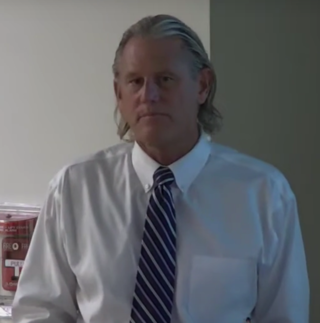
Kevin Witkos is a Republican member of the Connecticut State Senate, representing the 8th District since 2009. He served as Deputy Senate Republican President Pro Tempore since January 2017 to January 2019. and previously served as Minority Leader Pro Tempore from 2014 to 2016 and Caucus Chairman for Outreach since 2013. Witkos served as the State Representative from the 17th district which includes Canton and part of Avon from 2003 to 2008.
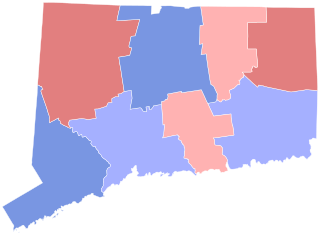
The 2018 Connecticut gubernatorial election took place on November 6, 2018, to elect the next governor and lieutenant governor of Connecticut, concurrently with the election of Connecticut's Class I U.S. Senate seat, as well as other elections to the United States Senate in other states, elections to the United States House of Representatives, and various state and local elections. This race's Democratic margin of victory was the closest to the national average of 3.1 points.

Cannabis in Connecticut is legal for recreational use since July 1, 2021. Medical use was legalized through legislation passed in 2012.
Clergy for a New Drug Policy (CNDP) is an American organization of religious leaders which seeks to reform drug laws in the interest of social justice. The group was begun in 2015 by Chicago United Church of Christ pastor Reverend Al Sharp. They focus on the adverse effects of the War on Drugs including how it has disproportionately impacted low income and minority communities, specifically African Americans. Instead of punishment for drug users, which they have pointed out has not worked in reducing drug usage and crimes within the United States, the organization advocates for a rehabilitation-focused method of fighting addiction. They cite programs like Vancouver's “Insite Supervised Injection Site”, which provides drug addicts with clean needles, medical care, and access to addiction therapists as inspiration for the organization's policy. CNDP initiatives also practice the Four Pillars Drug Strategy first established in Europe, which focuses on four principles: harm reduction, prevention, treatment, and enforcement. While the group focuses primarily on drug reform (mainly Marijuana regulation and legalization), they also look for this change in policy to be a part of a greater movement focusing on social equity and prison reform, including tackling recidivism. The group is composed of members of Catholic, Quaker, Muslim, Protestant, Jewish and Unitarian Universalist clergy.

The 2022 Connecticut gubernatorial election took place on November 8, 2022, to elect the governor of Connecticut. Incumbent Democratic Governor Ned Lamont ran for re-election to a second term in office. The race simultaneously took place with the election to the state's Class III Senate seat. This election featured a rematch of the previous 2018 gubernatorial election, pitting Lamont against Republican Bob Stefanowski, who he previously defeated by 3.2% of the vote. This time Lamont won re-election by a wider margin, becoming the first Democrat to win a gubernatorial election by more than 5 points in the state since 1986. This is the first time since 1994 that Tolland County voted Democratic in a gubernatorial election.

U.S. President Joe Biden stated in February 2021 that his administration will pursue cannabis decriminalization as well as seek expungements for people with prior cannabis convictions. It can still be found on his campaign website under sentencing reform. As of October 2022, Biden pardoned thousands of people convicted of marijuana possession under federal law.

Josephine Day Bennett was an American activist and suffragist from Connecticut. She was a member of the National Women's Party (NWP) and campaigned for women's suffrage outside of the White House, leading to her arrest. Bennett was also involved in other social issues and was supportive of striking workers.
References
- 1 2 Geluardi, John (2016). Cannabiz: The Explosive Rise of the Medical Marijuana Industry. Taylor & Francis. p. 112. ISBN 9781317262824.
- ↑ Cohen, Laurence D. (1999-11-07). "Fighting The War Against Drug Policy". Hartford Courant . Hartford, Connecticut. p. 39. Retrieved 2022-09-11– via Newspapers.com.
- ↑ "Should marijuana be legalized in Connecticut? Yes. Laws have created a black market". Hartford Courant. Hartford, Connecticut. 1997-08-23. p. 6. Retrieved 2022-09-11– via Newspapers.com.
- 1 2 Associated Press (August 3, 1998) "Windsor couple work to solve drug problem by legalizing narcotics", The Day .
- ↑ Taylor, Kevin (2003-12-14). "Labour MP promotes visit by legal-drugs advocate". NZ Herald. Retrieved 2022-09-11.
- ↑ Bass, Paul (2006-02-12). "3rd-Party Candidate's 1st-Class Issue". Hartford Courant . Hartford, Connecticut. p. NE16. Retrieved 2022-09-11– via Newspapers.com.
- ↑ "Thornton's Stance On Drugs". Hartford Courant. Hartford, Connecticut. 2006-02-19. p. NE02. Retrieved 2022-09-11– via Newspapers.com.
- ↑ Haigh, Susan (October 2, 2006). "Sponsors Disagree On Including Green Party in Gubernatorial Debate". The Hour . p. A3. Retrieved 31 August 2015.
- ↑ Keating, Christopher (2022-09-11). "Connecticut Republicans trying to win attorney general's office for first time in more than 60 years in 3-way battle". Hartford Courant. Retrieved 2022-09-11.
- ↑ "Green Party leader to receive award from the Drug Policy Alliance for leadership in drug law reform". Archived from the original on 2008-05-07. Retrieved 2008-05-07.